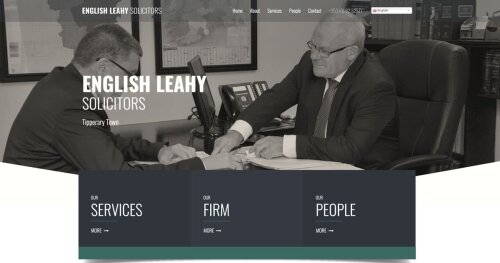Best Restructuring & Insolvency Lawyers in Ireland
Share your needs with us, get contacted by law firms.
Free. Takes 2 min.
Or refine your search by selecting a city:
List of the best lawyers in Ireland
About Restructuring & Insolvency Law in Ireland
Restructuring and insolvency law in Ireland covers the legal processes and frameworks that apply when businesses or individuals are unable to pay their debts. It aims to provide solutions for distressed companies and individuals while balancing the interests of creditors and other stakeholders. Restructuring usually refers to efforts to reorganize the financial or operational structure of a business to restore its viability, while insolvency refers to a state where liabilities exceed assets and debts cannot be paid as they fall due. Irish law offers several legal mechanisms to assist financially troubled entities with the aim of either protecting the business, maximizing asset recoveries or achieving a fair distribution among creditors.
Why You May Need a Lawyer
Legal advice is crucial in restructuring and insolvency matters because these situations are often complex and require a deep understanding of the law and available procedures. Some common reasons to seek legal help include:
- Your company is experiencing financial distress and you are unsure of the options available.
- You are a creditor concerned about your ability to recover debts from an insolvent customer or supplier.
- You are a director worried about your legal duties and potential personal liability.
- You want to negotiate with creditors or restructure existing debt arrangements.
- You need to initiate or respond to formal insolvency proceedings such as liquidation or examinership.
- You are facing pressure from lenders or threat of enforcement such as receivership.
A solicitor specializing in restructuring and insolvency can provide tailored advice, represent you in negotiations or court proceedings, and help protect your interests during what is often a stressful and uncertain time.
Local Laws Overview
Irish restructuring and insolvency law is mainly governed by the Companies Act 2014, with supplementary regulations and rules from the courts. The main procedures available are:
- Examinership: A court-supervised rescue process for companies that are insolvent but have a reasonable prospect of survival. It allows for protection from creditors while a scheme of arrangement is prepared.
- Liquidation: The process of winding up a company and distributing its assets to creditors. This can be voluntary (initiated by the company itself) or compulsory (ordered by the court).
- Receivership: When a secured creditor appoints a receiver to take control of some or all of the company’s assets to recover debts owed.
- Personal Insolvency: Individuals can avail of options like the Debt Relief Notice (DRN), Debt Settlement Arrangement (DSA), or Personal Insolvency Arrangement (PIA), and as a final resort, bankruptcy.
Directors have statutory duties, including the obligation to act in the best interests of the company and its creditors once insolvency is imminent. There are also provisions relating to preferential payments, improper trading, and personal liability for directors in certain circumstances.
Frequently Asked Questions
What is the difference between restructuring and insolvency?
Restructuring involves reorganizing a business to improve its financial position, often to avoid insolvency. Insolvency refers to a situation where an individual or company cannot pay their debts as they become due.
What are the early warning signs of insolvency?
Common signs include cash flow issues, mounting debts, overdue taxes, pressure from lenders or suppliers, and difficulty collecting receivables. Early engagement with a solicitor or accountant is advisable.
What is examinership in Ireland?
Examinership is a court-supervised process intended to help insolvent companies restructure and survive. During examinership, the company is protected from its creditors for a specific period while a restructuring plan is formulated.
How does liquidation work?
Liquidation is the process of winding up a company’s affairs, selling its assets, and distributing the proceeds to creditors. Once complete, the company is dissolved and ceases to exist.
Can directors be held personally liable for company debts?
Generally, directors are not personally liable for company debts. However, if they have engaged in reckless or fraudulent trading or have breached their duties, they can be held personally responsible in certain circumstances.
What is receivership?
Receivership occurs when a secured creditor appoints a receiver to take control of the company’s assets covered by a security agreement, usually for the purpose of repaying outstanding debt.
What options do individuals have if they cannot pay their debts?
Individuals can apply for a Debt Relief Notice, Debt Settlement Arrangement, or Personal Insolvency Arrangement under the Personal Insolvency Act 2012, or opt for bankruptcy as a last resort.
How are creditors prioritized in an insolvency?
The order of payment is generally: secured creditors, preferential creditors (like employees and certain taxes), unsecured creditors, and finally shareholders. Certain payments, if made shortly before insolvency, may be recoverable.
Are there alternatives to court insolvency proceedings?
Yes, informal arrangements and negotiations with creditors, or processes like Schemes of Arrangement, can sometimes provide solutions outside court. Legal and financial advice is key to exploring these options.
What should directors do if they suspect insolvency?
Seek immediate professional advice. Avoid taking on new credit, making preferential payments, or concealing assets. Directors must prioritize creditors’ interests and may need to consider formal insolvency options.
Additional Resources
If you need more information or support regarding restructuring and insolvency in Ireland, the following resources can be helpful:
- Insolvency Service of Ireland (ISI): The independent government body responsible for personal insolvency and bankruptcy processes.
- Companies Registration Office (CRO): Provides company information and insolvency filings.
- Law Society of Ireland: Lists qualified solicitors and provides general legal guidance.
- Citizens Information: Offers accessible explanations of legal procedures and rights.
- Chartered Accountants Ireland: Professional body for accountants experienced in restructuring and insolvency.
Next Steps
If you are facing potential insolvency, or if you need to restructure a company or navigate personal insolvency options, consider the following steps:
- Gather financial documentation and records of debts, assets, and recent transactions.
- Contact a solicitor who specializes in restructuring and insolvency for an initial consultation.
- Discuss your situation openly and explore all available options, both formal and informal.
- Take advice before making any significant payments or decisions that might affect creditors or your legal position.
- Stay informed about deadlines or necessary filings, especially if formal proceedings have commenced.
Dealing with financial difficulties can be daunting, but early professional advice can help manage risks, protect assets, and guide you towards the best possible outcome for your circumstances.
Lawzana helps you find the best lawyers and law firms in Ireland through a curated and pre-screened list of qualified legal professionals. Our platform offers rankings and detailed profiles of attorneys and law firms, allowing you to compare based on practice areas, including Restructuring & Insolvency, experience, and client feedback.
Each profile includes a description of the firm's areas of practice, client reviews, team members and partners, year of establishment, spoken languages, office locations, contact information, social media presence, and any published articles or resources. Most firms on our platform speak English and are experienced in both local and international legal matters.
Get a quote from top-rated law firms in Ireland — quickly, securely, and without unnecessary hassle.
Disclaimer:
The information provided on this page is for general informational purposes only and does not constitute legal advice. While we strive to ensure the accuracy and relevance of the content, legal information may change over time, and interpretations of the law can vary. You should always consult with a qualified legal professional for advice specific to your situation.
We disclaim all liability for actions taken or not taken based on the content of this page. If you believe any information is incorrect or outdated, please contact us, and we will review and update it where appropriate.
Browse restructuring & insolvency law firms by city in Ireland
Refine your search by selecting a city.














